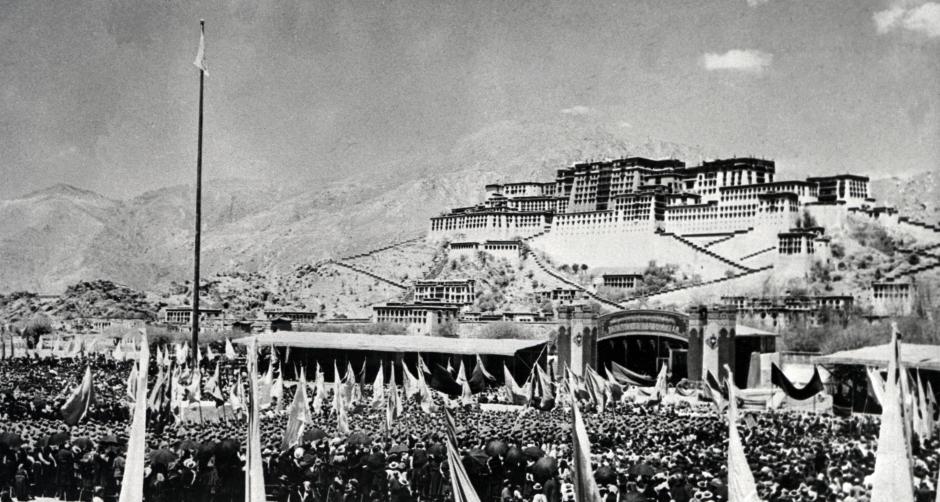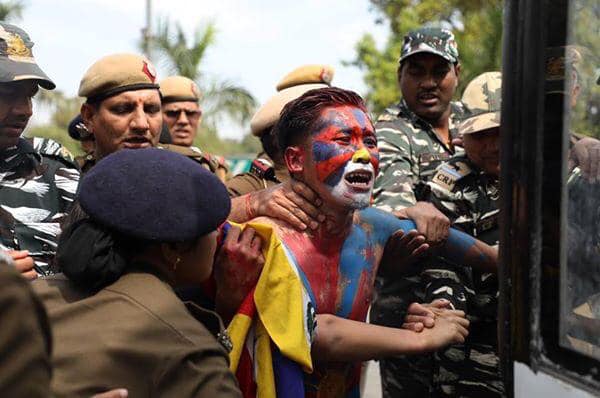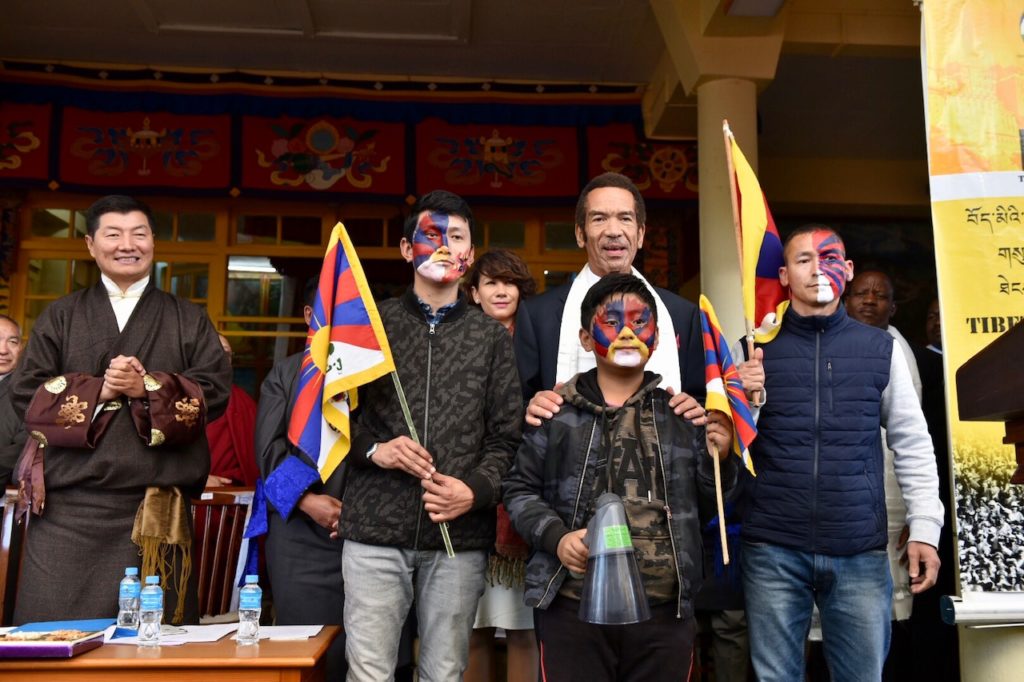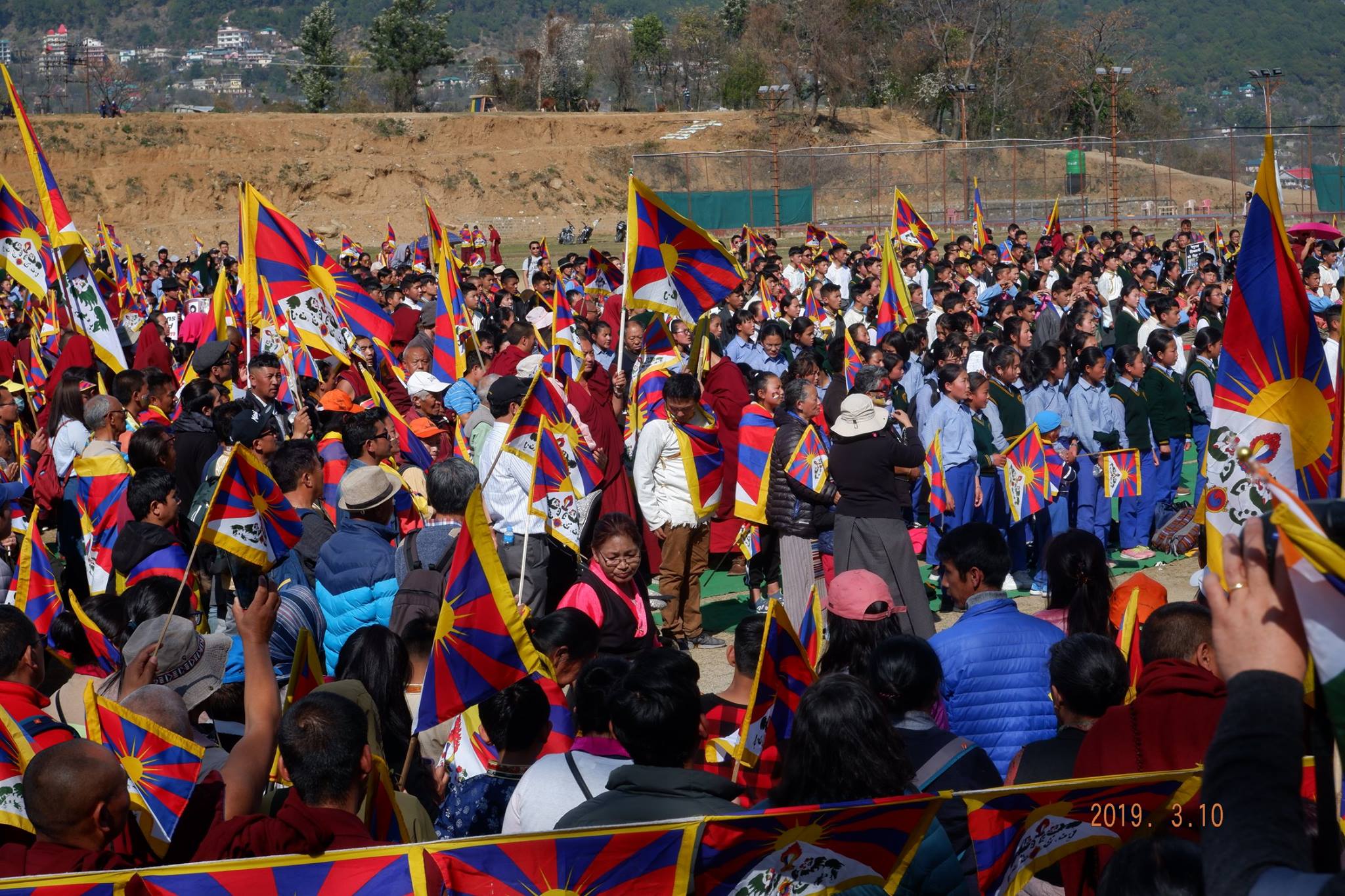
Tibetan Uprising against Chinese rule March 10, 1959, in front of the Potala Palace
Photo: Quartz
March 10, 2019 marked the 60th anniversary of Tibetan National Uprising Day. Around the world, protests, publications and networks acknowledged the ongoing illegal occupation of Tibet by China.
On March 10, 1959 Tibetans rose up against the Chinese occupation, attempting to liberate themselves from the Peoples Republic of China. The Chinese shot and killed thousands of Tibetan people in the capital of Lhasa and have since continued their repression of Tibetans and destruction of Tibetan culture. The death of approximately 20% of the population of Tibet – as well as the ruin of most of Tibet’s historical and religious monuments – can be attributed to China.
Shortly after the uprising in Lhasa, the danger facing His Holiness the Dalai Lama was recognised and he and 80,000 Tibetans trekked across the Himalayas to take refuge in India, where he and many others have lived for the past 60 years.

TYC protester being arrested in Delhi
Photo: TYC Facebook
Throughout the Chinese occupation of Tibet, which began in 1949, there has been restrictions for the people of Tibet; these are increased in the runup to anniversaries such as Uprising Day with heavy police presence and surveillance, travel restrictions – including, in come cases, limiting the sale of gasoline – and increased restrictions on information exchange, including social media. Tsundu Oser, President of the Sidney Regional Tibetan Youth Congress (TYC) said, “There are no human rights in Tibet, no freedom in Tibet and no freedom of speech in Tibet. So Tibet is very controlled … These days, China is destroying the Tibetan cultural identity.”
In addition, Tibet’s borders are closed to outside travelers during the month before Uprising Day and access for journalists is consistently difficult to gain.
In Lhasa this year, security is widely reported to have been heavily increased, including surveillance and extra questioning of any people coming into the city from elsewhere. A source said to Radio Free Asia: “They are also being asked to keep their mobile phones switched on at all times, and are being reminded to strictly abide by the law and not to become involved in any activities considered to be harmful to (China’s) national security,”

The official event at Dharamshala on March 10.
Photo: tibet.net
In Dharamshala, events commemorating the anniversary, included a photo exhibit at the Tibet Museum showcasing a history of events since the first National Uprising Day. Leaders from ten nations gathered at the official event in Tsuglakhang, the main temple in Dharamshala, to recognise solidarity with Tibet and to acknowledge the 60th anniversary of Tibetan National Uprising Day.
Speeches were given at Namgyal Monastery on March 10, concluding with chief guest Former President of Botswana Dr Seretse Khama Ian Khama stating, “While your own struggle has been long and painful, you can take solace in the fact that in your hearts you remain undefeated, in your minds you are already liberated. With such a mindset and the power of your collective determination, your own victory is ultimately certain.”

Tibetans in Dharamshala on March 10.
Photo: Contact/Lha
A peaceful protest march from Mcleod Ganj to Dharamshala was organised by five NGOs: TYC; Tibetan Women’s Association; Gu-Chu-Sum Movement of Tibet; Students for a Free Tibet and the National Democratic Party for Tibet. TYC said of the event, “TYC will commemorate and dedicate the 60th anniversary of the Tibetan National Uprising day to thousands of Tibetans who have sacrificed their lives and thousands who continue to suffer due to China’s illegal occupation.”
And in Delhi 150 protestors were arrested outside the Chinese Embassy – they were later released.
Support for Tibet extends internationally and is shown in events across the globe including a mention from the Ministry of Foreign Affairs Taiwan on social media in support of Tibetan people; protests worldwide organised by Tibetan communities in Japan, Europe, the Americas and more and the resumption of the raising of the national Tibetan flag in Prague’s City Hall. Sikyong Lobsang Sangay, President of the Tibetan Government-in-exile, said after his recent visit to Prague, “Each time I come here, I get encouraged, I get the fuel to go back and say ‘There are people around the world who support us, who believe us.’”

(Clockwise) Shri Shanta Kumar, former Chief Minister, Himachal Pradesh; MEP Thomas Mann; MP Michael Brand; MP Antonella Incerti; Lucia Duris Nicholsonova, Deputy Chairman of the Slovak National Council; MP Garnett Genuis; MP Albeto de Belaunde; MP Mei Nu Yu; MP Sandy Kalyan; Dr. Yang Jianli, President, Citizen Power Initiatives for China
Photo: tibet.net
Honorable Shri Shanta Kumar, sitting member of the Indian Parliament, said in his speech, “The late Jayaprakash Narayan has said, ‘Is Tibet lost forever? No. A thousand times no. Tibet will not die because there is no death for the human spirit.’”




 Print
Print Email
Email